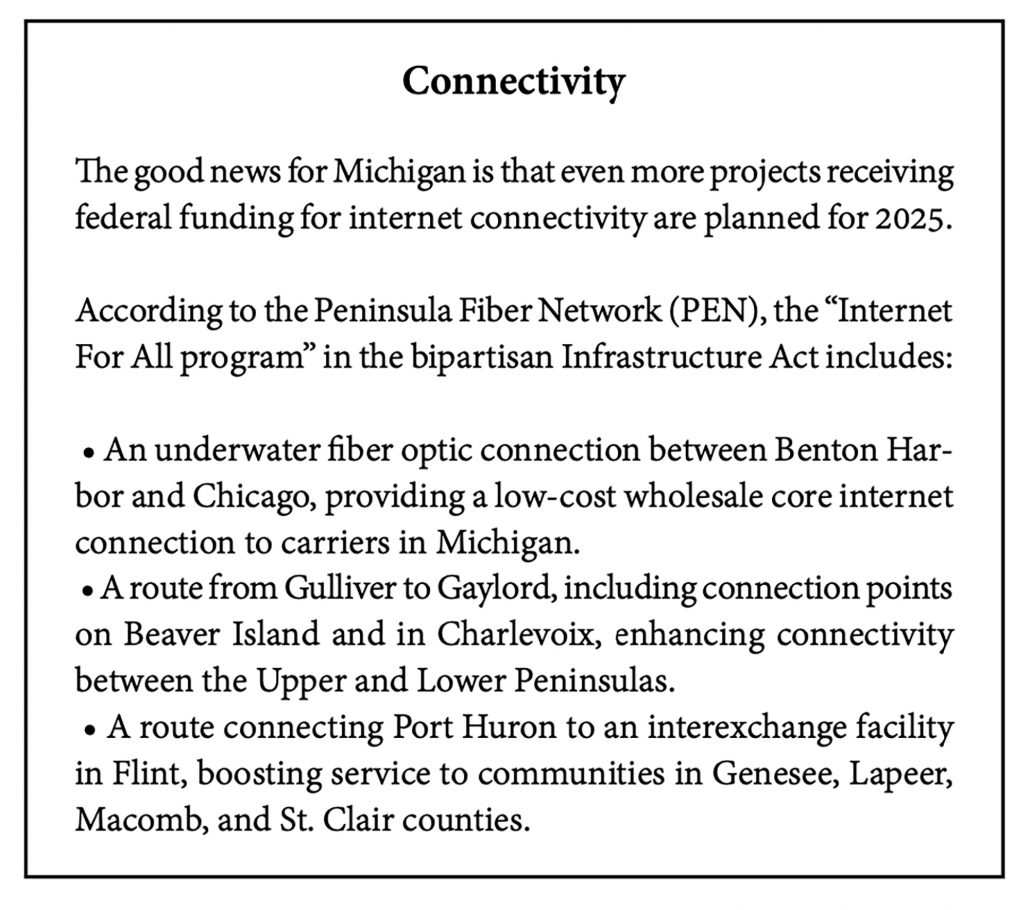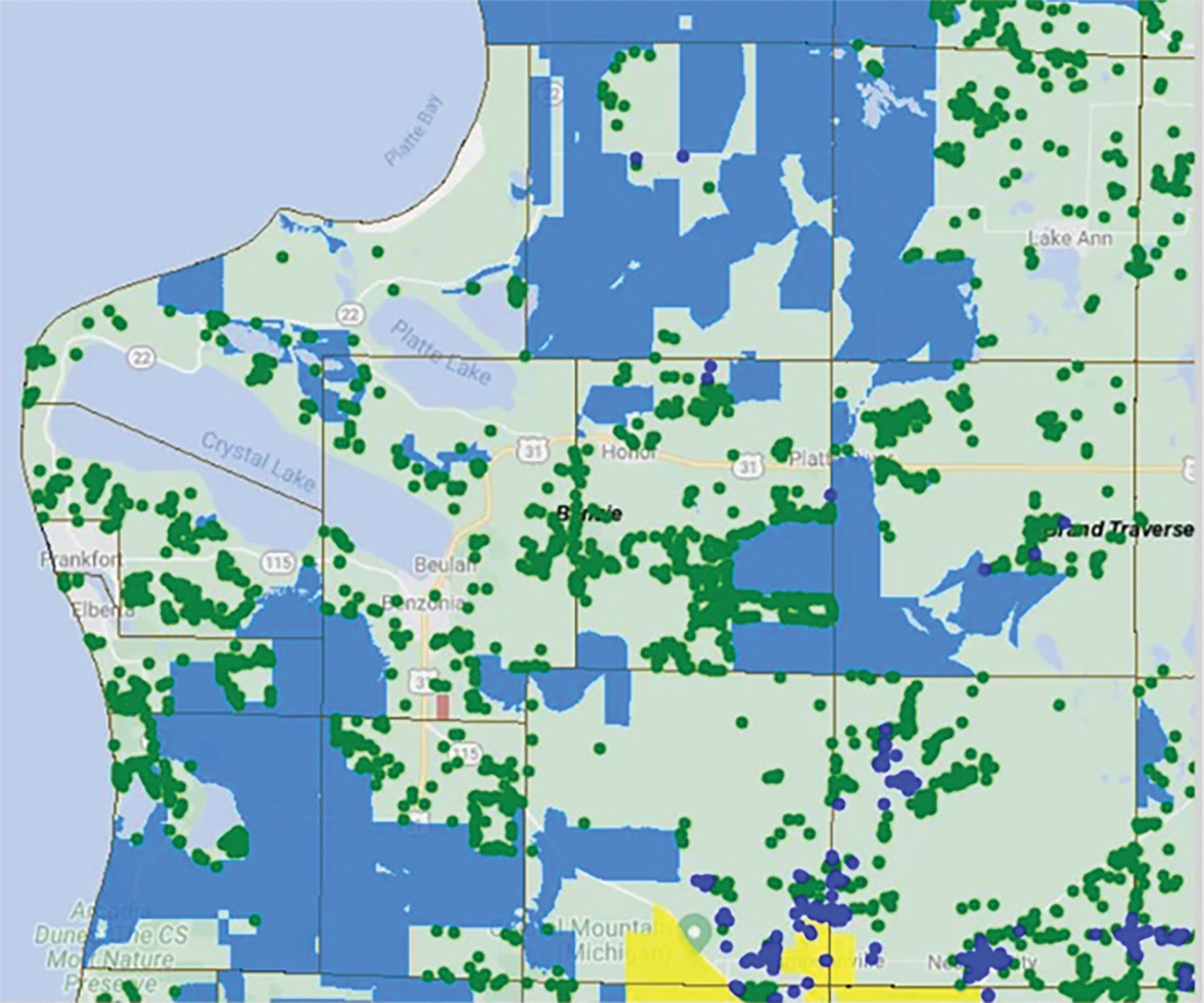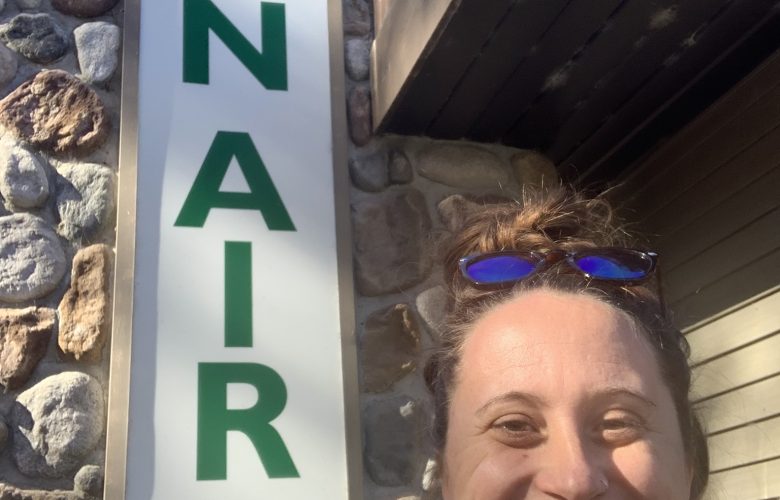Broadband internet improvements in Benzie County and beyond
By Annis Pratt
Current Contributor
It all began in August 2023 with a call from AcenTek, the telephone company that I use in Thompsonville, asking me if they could come over to plan an installation of fiber optics.
Although we only live at our cottage during the spring and summer seasons, we often run Quantellia—my daughter Lorien’s internet business—from there, so we definitely needed better internet speed.*
I was certainly pleased to hear that AcenTek was bringing fiber optics to our cottage, but I asked nervously how much the installation would cost.
“Nothing,” replied the AcenTek caller.
“Nothing!” I exclaimed: “How can that possibly be?”
But it was.
The crew arrived a little over a year later, during the fall of 2024, to install our new fiber optic system. When we told them how hard it had been to get a signal through the fire door to the modem in our dorm, they provided an extra connection, so that we could work from our living room.
The minute that the system was on, we noticed a very satisfying uptick in our internet speed.
We are undoubtedly among many home-based businesses in our rural area whose expanded broadband service over the past few years is a real benefit—and the faster system should provide an attraction for newcomers to move to Northern Michigan, as well.
But access to fast internet is about more—as we all became acutely aware during the COVID-19 pandemic, internet access is a critical infrastructure in today’s modern society, just like other utilities, such as water, propane, and electricity.
Years of Work
Good, reliable internet can be hard to come by, for those of us in the more remote parts of Northern Michigan—but that is starting to change.
For almost a decade, there have been people in both the private and public sectors trying to make it a reality for everyone here in Benzie County.
Christopher Varenhorst (43)—president of Eclipse Communications, a Benzonia-based internet company—explained to the Benzie County Record Patriot back in August 2022 how fiber internet differs from wireless internet:
“With wireless, we have problems with topography… [whereas] when running fiber down a street, it will be available to everybody we run it by. With wireless, sometimes you can get it to one person’s house, but there are obstructions preventing their neighbor from having a wireless connection.”
That was the case for our neighbors in Thompsonville.
Justin and Dorothy Schroeder, year-round residents, have been delighted to find that—since the fiber was put in last fall—they can do heavy database upload/download with no issues, they have been able to reduce their phone bills by removing hotspot support that they no longer need, and they cut back on their satellite television plan by instead using “streaming” platforms via the internet.
Schroeder family visits—when everyone is on tablets, TV, and phones all at the same time—have gone much more smoothly, and it has been the same at our place when the grandkids come to visit!
Internet access is about more than just home businesses and Netflix, though: it is a real economic driver.
For instance, Benzie County government officials have said multiple times to the press that real estate agents have told them of lost sales, in large part because of a lack of good internet access—in other words, people who otherwise wanted to move here were not doing so, because of the internet problems.
In fact, Varenhorst started his company, Eclipse, in 2016, as a result of he, himself, not being able to get internet when he moved to his home in Beulah in 2010.
Eclipse is just one rural internet provider that is working to bring better internet access to the underserved areas of Benzie County. In 2019, Eclipse purchased the M-22 Internet Project—an Arcadia-based communications company that was also working to expand broadband coverage in Benzie—which allowed Eclipse to increase in network capacity quickly and expand faster.
As mentioned, there is AcenTek, with offices in Mesick in nearby Wexford County, as well as Allendale down state and Houston, Minnesota.
Likewise, there is 186 Networks, headquartered out of Rapid City in Kalkaska County, as well as Summit Digital in the Cadillac/McBain area.
There is also Cherry Capital Connection, an Elk Rapids-based internet service provider that has been working in Northern Michigan for 19 years and in Benzie County specifically since 2023.
Through the “Internet for All, Benzie County” project, an open access network model allows internet providers to utilize the same infrastructure as Cherry Capital Connection which provides choice to our community and competition in the market.
Last summer, for instance, a new emergency communications tower was going in between US-31 to Frankfort, meaning new connections for residents would be branching from the US-31 line. Cherry Capital also began adding Inland Township and Crystal Lake Township residents as customers, with Benzonia and Joyfield township residents seeing opportunities to connect this year. Meanwhile, Cherry Capital technicians are designing a network for Almira and Homestead townships in the future.
And sure, lots of Benzie County residents have traditionally used the big names—[Charter] Spectrum, ATT, T-Mobile, Starlink, and others—for their internet services, but arguably it is the smaller local guys like AcenTek, Eclipse, and Cherry Capital who are now bringing internet to the most rural and underserved parts of our county, thanks to big recent investments.
“The smaller companies had always lacked access to capital,” Varenhorst tells The Betsie Current, noting that big companies were better able to leverage grant opportunities. “The expense of fiber-to-the-home in unserved and underserved areas is dependent upon population density and [income]. For a long time, smaller companies lacked operational flexibility to make such private investments, much less be able to get an acceptable [return on investment, ROI].”
He continues:
“However, the smaller companies are by far more agile than the larger companies, which nearly exclusively wait for state or federal tax allocations to capitalize a fiber build-out… but the larger investments over the past few years have been earmarked for large and small companies alike, versus in years past, when only the large companies were able to draw the funds.”
In other words, significant investments had already been made and completed by the larger companies here in Benzie County, so what remains are somewhat smaller—but still significant—areas that the smaller companies are now moving to accommodate.
“The advantages of the smaller companies—we know the community better, where there is access and where there isn’t; things like that—could not be leveraged until recently,” Varenhorst says. “So there is still years of work to do, as small companies in the area are leveraging multiple fund sources, each with their own requirements. Any change to how these grants play out directly impacts other grant sources, all of which adds up to that small company being able to financially survive. That is the primary driver here.”

Public-Private Partnerships
Benzie County commissioners have been talking about this issue for almost a decade now, with increasing urgency since the pandemic years, when everyone was stuck at home.
One of the first things they needed to know, before they were willing to make a big investment of time and money, was how many people currently fall in that “underserved” category?
Although data existed from the Federal Communications Commission (FCC), many questioned how trustworthy and granular the data was: supposedly 90 percent of Benzie County had broadband coverage with appropriate speeds. However, that statistic came from self-reporting data of the big internet service providers and often did not reflect reality.
In independent surveys conducted in 2021, both Benzie and Manistee counties found a high demand for better internet services—and many places that were without.
The Manistee County Broadband Survey reported that 60 percent of residents were dissatisfied with their internet coverage and that rural areas were concerned with the digital divide between their services and those of urban areas.
Among the concerns expressed by Benzie County’s respondents were coverage gaps—especially in Blaine, Colfax, and Joyfield townships—and internet speed and access, particularly the way that they relate to telehealth access.
So began real action to improve our rural internet access, via partnerships between private companies and varying levels of government—federal, state, and local.
For instance, my Thompsonville (Manistee County) fiber optic update used contributions from AcenTek; the Broadband Equity, Access, and Deployment (BEAD) Program, administered by the National Telecommunications and Information Administration (NTIA); and the United States government, through the bipartisan infrastructure law of 2021, also known as the Infrastructure Investment and Jobs Act.
Meanwhile, the funding for broadband in Benzie came from BEAD; Realizing Opportunity with Broadband Infrastructure Networks (ROBIN); and funds from the America Rescue Plan Act (ARPA).
In fact, Benzie County commissioners dedicated $1.5 million of our $3.45 million total ARPA money toward expanding broadband—and via partnerships and other grants, they were able to turn that into more than $8 million to help more than 4,000 homes.
Not only are private companies and our local government involved, but so are our community members in the nonprofit world.
When it comes to broadband access, Grow Benzie has spent the last few years helping to assemble task forces, creating broadband expansion plans, and securing funding to get fiber installed—especially in the underrepresented, under-invested, and underserved areas in our 10-county region. **
And then, last month, on February 28, breaking news for our area came in: the Michigan High-Speed Internet Office announced 13 recipients of a $10.6 million grant for Michigan’s Inclusive Training, Technology, and Equity Network (MITTEN), which is meant to enhance digital access across the state—and Grow Benzie was awarded $857,870 to provide essential resources and skills to underserved communities throughout 10 counties in Northern Michigan.
Antrim, Benzie, Charlevoix, Emmet, Grand Traverse, Kalkaska, Leelanau, Manistee, Missaukee, and Wexford counties will benefit from the MITTEN grant, which was secured with partnerships with other community-oriented organizations: Central Michigan University (CMU) Rural Health Equity Institute, Networks Northwest, Community Broadband Action Network, United Way of Northwest Michigan, Mid-Michigan and Northland Library Cooperatives.
This grant will be used for digital skills training, device distribution, broadband access expansion, and community engagement in partnering with community organizations to enhance telehealth, workforce development, and engagement.
“We are thrilled about the MITTEN grant, because it builds on the tremendous work already done by our county government to expand broadband infrastructure,” says Jackie Luedtke Borozan (37), Grow Benzie’s community organizer. “Digital equity is about ensuring that households and families not only gain access to reliable high-speed internet but also have the support they need to fully benefit from it. Benzie County leadership has prioritized this issue for years, and with this grant, we are now seeing these efforts pay off in meaningful ways.”
Health and Education
We learned during the COVID-19 pandemic how useful the internet can be to access online classrooms. Now that our children are back in school five years later, however, there are still plenty of applications for this technology—the rest of us can use online courses to earn a degree from a college or university and improve our employment opportunities.
With the old broadband that was accessible in our Thompsonville area, Sarah Dodge, another year-round Thompsonville neighbor of mine, struggled to study for her counseling degree online via the University of Denver—she had to drive all over the place looking for connectivity. Now, however, she can sit comfortably at home and earn her degree with far less stress and hassle.
Moreover, in rural areas—where doctors are scarce and medical clinics are few and far between—better internet provides telehealth options, so that you can talk to someone about a chronic illness and even get preventative check-ups, like blood pressure monitoring and medication checks.
“Most people still prefer to do the old school, in-person appointments,” says Alicia Harmon (39), communications officer at Northwest Michigan Health Services. “But we do have telehealth as an option, in case something comes up; like if somebody doesn’t have a sitter, they can call to request to switch to a telehealth appointment, instead.”
Chelsea Szafranski, system director of digital health for Munson Healthcare, says:
“In the years since the pandemic, we’ve continued to use telehealth to remove barriers and increase access to healthcare. It can be an especially valuable tool to increase accessibility to specialty areas of medicine when childcare, mobility issues, transportation, and even the harsh winter weather can create real challenges. As a rural area, telehealth is an area of focus and an important component in the delivery of care—now and in the future.”
Not A Luxury
To sum it all up, from a 2021 article by Colin Merry in the Manistee News Advocate:
“We have to start talking about why broadband is not a luxury.”
He cited Rick Coates, then-executive director of the Benzie County Chamber of Commerce, on how widely accessible internet is “an economic driver. It is critical when talking about retaining businesses and attracting businesses… If you want to appeal to the remote workforce, it won’t happen without broadband. Areas in Northern Michigan are targeted worldwide as a place to reside. People are moving out of big cities, and they want to live in rural areas and work remotely. Until we get broadband sorted out, we’ll fall behind. We won’t be able to call on that workforce.”
It is truly amazing that, in four short years, so many Northern Michigan citizens have been able to work through national, state, county, and local community groups, along with private companies, to push funds and get it going.
“The pandemic really highlighted this problem—broadband had originally started going in around the turn of the century, but there hadn’t been big gains in connectivity for two decades” says Christopher Varenhorst, owner of Eclipse Communications. “Since 2021, things have been moving fast; this is the most movement that we’ve seen in this industry.”
*Lorien invented a form of Artificial Intelligence called Decision Intelligence; her company Quantellia.com builds models that businesses, governmental organizations, and nonprofit groups can use to arrive at their desired outcomes.
**For those who do not know, Grow Benzie is a nonprofit organization dedicated to increasing rural prosperity through a variety of community projects—including guilds dedicated to art, fabrics, seeds—as well as the incubation and encouragement for small businesses and enterprises. The Betsie Current has profiled several of Grow Benzie’s projects over the years, including an update last summer on Grow Benzie’s new staff and mission statement; check out our online archives to learn more.
Featured Photo Caption: The blue and yellow areas in this map of Benzie County may contain unserved or underserved households when it comes to internet service, but they are not eligible for ROBIN funding. Blue and green dots, meanwhile, represent 1,524 households that have been identified as eligible for ROBIN funding. There are more than 3,400 households that the state of Michigan is unclear as to the status of the internet service. These locations are being evaluated. Image courtesy of Cherry Capital Communications.




